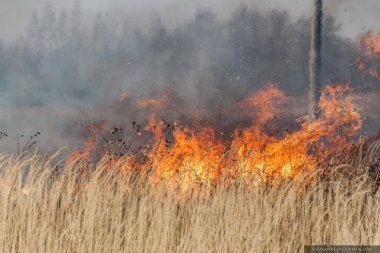
Every year, in autumn and spring, people start burning the grass, litter, and leaves. Thus, because of the non-availability of quick waste removal, the laziness of residents and attempts to cope with the responsibilities quickly, there arise uncontrolled fires that are difficult to put out on your own.
Every year, in autumn and spring, people start burning the grass, litter, and leaves. Thus, because of the non-availability of quick waste removal, the laziness of residents and attempts to cope with the responsibilities quickly, there arise uncontrolled fires that are difficult to put out on your own. Besides, when burning grass:
- a person can get burns, especially when petrol or other combustible substances are being used;
- the products of combustion, pesticides and heavy metals from roadside grass penetrate the air;
- burning grass or forest fires can do much harm to animals, such as hedgehogs, fire can destroy the birds’ egg clutches;
- the underground supply of seeds is being burned;
- fire and ash can damage the soil and degrade its fertility.
Most people don’t think about the consequences, because they don’t know that they are risking their own and others’ lives. Administrative penalties and a system of fines provided in some countries allow stopping people from wrongdoing, which can lead to an uncontrolled and destructive fire.
Consequences of seasonal burnings
Village people and remote towns’ residents mistakenly believe that burning of dry grass and leaves will help the soil, though, in reality, it’s better to use old plants to fertilize the soil. After burning, the soil needs 5 years for restoration and the animals can never return to live there; that leads to the disruption of the ecology of the entire area.
Nature took care of its own renewal. So, young trees have lower chances to burn than the old and rotten ones, and the grass rots, that’s why it’s not difficult for new plants to sprout in the same place. The soil has its own microflora, which perfectly supplies itself without burning, so the "butterfly effect" will work, even if only one insect dies.
Even the ground fires can damage the root system of plants, which is bad for their health. Ash left on the ground will keep the water from penetrating the soil, and plants will not be able to carry out photosynthesis.
Disruption of ecological balance and fires
The uninformed person has no idea how many animals and birds live in the grass: toads, hares, frogs, hedgehogs. Apart from them, larvae, pupae, ladybugs, earthworms, and other insects die. At seasonal burnings, there is a risk to disrupt the ecological situation and that can lead to birds, animals and insects extinction. But the main danger, caused by leaves burning is the fires. Every day thousands of people around the world are struggling against fires caused by nature and man. Any such disaster greatly harms nature, because it takes decades to treat the burnt soil and to plant new forests.
Experts spend a lifetime trying to identify fire-risk zones and prevent the fires, localize the fire and minimize the damage, while the rest of the people deliberately burn the leaves, making harm to the planet.
Read also:
Forest fires and ecology
Forest - lungs of the planet









